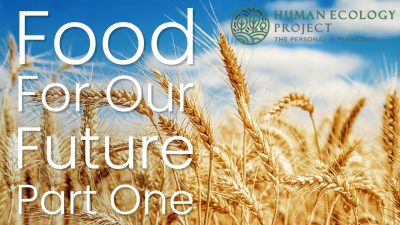Food For Our Future

What we eat is one of the most important relationships we have to the environment. It seems that we have forgotten that simple fact. Food is often seen as something manufactured and not a product of nature. We want to shine a little light on what makes sense regarding the human diet and why it is so important right now that we make choices that serve not only personal health but the survival of planet earth.
This short video is the first part of a series we are calling FOOD FOR OUR FUTURE. We are going to start with some of the major changes that have happened over the years to what we eat and why we eat it, the decisions that have taken us into our present nutritional waste land, and how we can move forward toward a healthy future for both human and non-human life.
Migration
From our ancient origins, human life has migrated to almost every location on the planet. We have settled in deep jungles, arctic tundra, deserts, and forests. Our primary concern has always been to find food. It is a matter of life or death. We did not have to concern ourselves with eating locally or in season; we ate what was available. The forces of nature were in charge.
Environments
If there was an abundance of nutritious plants, that was where we focused our efforts; If the soil was poor or the growing season short, we used animals. We discovered over time that out of the 400,000 species of plants there are only about 200 that are safe for us to eat and we focused on those.
These were not decisions we made in a conference hall. They were practical actions aimed at staying alive and creating homeostasis—that life-producing relationship with nature that governs all life.
A big part of our adaption was our ability to alter the quality of the food available to meet our needs. We learned to grow specific foods, cook, preserve, ferment, and otherwise make simple changes in the plants we relied on for our well-being.
Cooking has become a lost art
Consider what a genius trick it was to learn to cook. Cooking allowed us to increase the efficient use of many simple foods to fill our needs. We took the digestive process and made it external.
Cooking allowed us to expand the plants that we could use and increase the nutritional impact of them. It made it possible for us to take cereal grains and beans – the staples of the human diet over at least the last 10,000 years and soften the fibres, making the nutrients more available and easier to digest and metabolise.
Our understanding of cooking and fermenting foods made it possible for us to nourish our gut biome, reducing the amount of energy needed to digest and efficiently utilize a healthy range of vegetables, grains, beans, and other plant foods. You will find over 80 delicious and inexpensive recipes in my latest book Go Vegan. Join us in service for a healthy world for humans and non-humans alike. Thank you.
In good health


